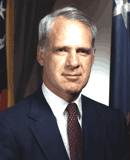United States Atomic Energy Commission
United States Atomic Energy Commission
The United States Atomic Energy Commission (AEC) was an agency of the United States government established after World War II by Congress with the Atomic Energy Act of 1946. Its purpose was to foster and control the peacetime development of atomic science and technology. Before the AEC, the development and production of nuclear weapons and nuclear energy were managed by the Manhattan Project during the war. The AEC took over these responsibilities and aimed to regulate the nuclear industry, promote nuclear power for civilian use, and manage nuclear weapons research and production.
History[edit | edit source]
The AEC was created as a response to the scientific and technological advancements made during the Second World War. The Atomic Energy Act of 1946, also known as the McMahon Act, dismantled the wartime secrecy surrounding nuclear technology and placed its control under civilian, rather than military, authority. This shift marked a significant change in how nuclear research and development were conducted in the United States.
During its early years, the AEC was instrumental in promoting the peaceful use of nuclear energy. It oversaw the construction of nuclear reactors for research purposes and the development of nuclear power plants to generate electricity. The AEC also managed the production of nuclear weapons, maintaining a balance between military needs and the promotion of peaceful nuclear applications.
Major Activities[edit | edit source]
The AEC's activities were diverse, covering areas such as nuclear research, safety regulations, and international cooperation. It was responsible for the licensing and regulation of nuclear facilities, ensuring that they met safety standards to protect public health and the environment. The AEC also conducted extensive research in nuclear medicine, contributing to advances in medical diagnosis and treatment.
One of the AEC's significant achievements was the promotion of nuclear power as a source of civilian energy. It supported the development of the first commercial nuclear power plant in the United States, which began operation in the 1950s. This initiative marked the beginning of the nuclear power industry in the country.
Controversies and Challenges[edit | edit source]
The AEC faced several controversies and challenges during its existence. One of the most significant was the issue of nuclear waste disposal. As the use of nuclear energy expanded, the problem of safely managing and disposing of radioactive waste became increasingly urgent. The AEC worked on developing long-term storage solutions, but the issue remains a challenge to this day.
Another area of concern was the health and environmental impact of nuclear testing. The AEC conducted numerous nuclear tests, some of which raised public health and environmental issues. The exposure of military personnel and civilians to radiation during these tests has been a subject of ongoing research and debate.
Dissolution and Legacy[edit | edit source]
In 1974, the AEC was dismantled, and its functions were divided between two new agencies: the Energy Research and Development Administration (ERDA) for the development and management of energy technologies, and the Nuclear Regulatory Commission (NRC) for the regulation of nuclear materials and facilities. This reorganization aimed to separate the promotional and regulatory functions of nuclear energy, addressing criticisms that the AEC's dual roles presented a conflict of interest.
The legacy of the AEC is complex. It played a crucial role in the development of nuclear science and technology, both for military and civilian purposes. However, its history also reflects the challenges and controversies associated with nuclear energy and weapons. The AEC's efforts in promoting nuclear power and its contributions to nuclear medicine and research have had lasting impacts, while its handling of nuclear safety, waste disposal, and testing continues to be scrutinized.
This government agency related article is a stub. You can help WikiMD by expanding it.
Search WikiMD
Ad.Tired of being Overweight? Try W8MD's physician weight loss program.
Semaglutide (Ozempic / Wegovy and Tirzepatide (Mounjaro / Zepbound) available.
Advertise on WikiMD
|
WikiMD's Wellness Encyclopedia |
| Let Food Be Thy Medicine Medicine Thy Food - Hippocrates |
Translate this page: - East Asian
中文,
日本,
한국어,
South Asian
हिन्दी,
தமிழ்,
తెలుగు,
Urdu,
ಕನ್ನಡ,
Southeast Asian
Indonesian,
Vietnamese,
Thai,
မြန်မာဘာသာ,
বাংলা
European
español,
Deutsch,
français,
Greek,
português do Brasil,
polski,
română,
русский,
Nederlands,
norsk,
svenska,
suomi,
Italian
Middle Eastern & African
عربى,
Turkish,
Persian,
Hebrew,
Afrikaans,
isiZulu,
Kiswahili,
Other
Bulgarian,
Hungarian,
Czech,
Swedish,
മലയാളം,
मराठी,
ਪੰਜਾਬੀ,
ગુજરાતી,
Portuguese,
Ukrainian
Medical Disclaimer: WikiMD is not a substitute for professional medical advice. The information on WikiMD is provided as an information resource only, may be incorrect, outdated or misleading, and is not to be used or relied on for any diagnostic or treatment purposes. Please consult your health care provider before making any healthcare decisions or for guidance about a specific medical condition. WikiMD expressly disclaims responsibility, and shall have no liability, for any damages, loss, injury, or liability whatsoever suffered as a result of your reliance on the information contained in this site. By visiting this site you agree to the foregoing terms and conditions, which may from time to time be changed or supplemented by WikiMD. If you do not agree to the foregoing terms and conditions, you should not enter or use this site. See full disclaimer.
Credits:Most images are courtesy of Wikimedia commons, and templates, categories Wikipedia, licensed under CC BY SA or similar.
Contributors: Prab R. Tumpati, MD






